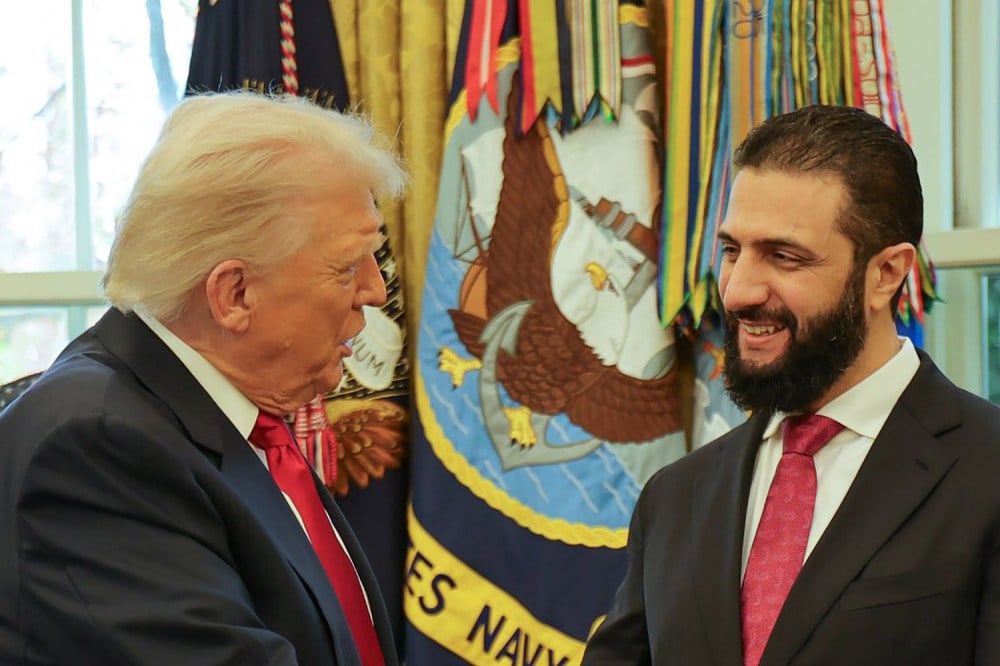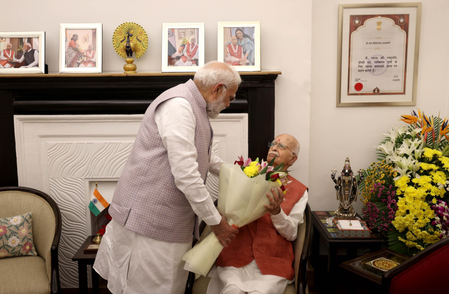Copyright Foreign Policy

Welcome back to World Brief, where we’re looking at a new page in Syria’s playbook, Brazil hosting the U.N. Climate Change Conference, and U.S. aggression in Latin America. Historic State Visit U.S. President Donald Trump hosted Syrian President Ahmed al-Sharaa at the White House on Monday, marking the first time that a Syrian head of state has visited Washington in almost 80 years. The meeting—notable also for Sharaa’s history as the leader of al Qaeda’s Syria affiliate—represents a major thawing of relations with the onetime pariah state. Less than a year ago, Sharaa had a $10 million U.S. bounty on his head for his ties to al Qaeda. But following the overthrow of dictator Bashar al-Assad last December, an operation led by Sharaa’s militia, Sharaa rebranded his (and Syria’s) global image as a potential ally to the West. Already, the United Nations Security Council has lifted some sanctions on Sharaa and officials in his government to create a pathway for better global cooperation. And after he met with Trump in May, the U.S. president praised Sharaa as being a “tough guy” and a “fighter” with a “very strong past.” Sharaa is hoping to use that “tough guy” image to strike a deal with the United States to permanently lift U.S. sanctions on Syria. In 2019, Trump imposed sanctions under the Caesar Act to punish Damascus for alleged widespread human rights abuses under Assad’s regime. But in June, Trump waived those penalties via an executive order, citing the need to “give Syrians a chance at greatness.” Trump appeared to try to appease Sharaa’s demands on Monday by having the Treasury Department announce that it is halting most sanctions on Syria, except for those involving transactions with Russia and Iran. But Sharaa seeks a permanent solution, which requires an act of Congress, and U.S. lawmakers appear hesitant to grant such a request unless Damascus adheres to several conditions, such as guaranteeing religious pluralism in the country and improving ties with Israel. Removing U.S. sanctions on Damascus is vital for Syria to join the global financial market; Sharaa has argued that foreign investment is needed to bolster the country’s health care system and rebuild its critical infrastructure after the 13-year civil war decimated the nation. The Syrian president is also pursuing outside funding to help with war reconstruction, which the World Bank estimates will require at least $216 billion. But Sharaa is not the only one seeking to gain from a new U.S.-Syria partnership. Trump is hoping to convince Damascus to join Washington’s 89-country coalition dedicated to fighting the Islamic State—something that Syria’s new military and its Kurdish-led Syrian Democratic Forces already do. He also aims to expand the Abraham Accords by having Syria formalize ties with Israel, establish a military presence at Mezzeh airbase in Damascus, and build a Trump Tower in the capital. “Washington and its regional allies see an opportunity to lock in place a favorable revision of the regional order by embedding post-Assad Syria firmly in their camp,” political science professor Marc Lynch wrote in Foreign Policy. Today’s Most Read The Man Who Could Topple Orban by Lili Rutai Trump Should Oust Maduro by Matthew Kroenig Gen Z Is Taking to the Barricades by Christian Caryl The World This Week Tuesday, Nov. 11: French President Emmanuel Macron hosts Palestinian Authority President Mahmoud Abbas. Iraq holds parliamentary elections. Indian Prime Minister Narendra Modi begins a two-day trip to Bhutan. Kazakh President Kassym-Jomart Tokayev begins a two-day trip to Russia. Friday, Nov. 14: German Chancellor Friedrich Merz hosts Cypriot President Nikos Christodoulides. Sunday, Nov. 16: Chile holds a general election. Monday, Nov. 17: Russia hosts a two-day Shanghai Cooperation Organisation summit. What We’re Following Seeking unity at COP30. The two-week U.N. Climate Change Conference (COP30) kicked off in Brazil on Monday with around 50,000 people from more than 190 countries in attendance. This year’s emphasis is on unity, as experts worry that increasing isolationism will exacerbate climate change. “Either we decide to change by choice, together, or we will be imposed change by tragedy,” conference President-designate André Corrêa do Lago wrote in a letter to negotiators on Sunday. “We can change. But we must do it together.” Whereas past summits have focused on lofty, multilateral agreements that often go unfulfilled, though, this year’s conference is expected to prioritize smaller efforts that don’t require consensus in order to avoid the climate denialism policies of some of the world’s biggest polluters—notably, the United States. This is the first time that Washington has snubbed the gathering in its 30 years of existence. But while the United States is taking a backseat in climate leadership, other foreign powers are hoping to pick up the mantle. The European Union is one of those leading the charge, though internal dissent over taxing carbon emissions has soured its reputation. Looking for more expert insight? Stay up to date with FP’s extensive COP30 coverage. Strengthening cooperation. Representatives from the EU and the Community of Latin American and Caribbean States concluded their two-day summit in Colombia on Monday after signing a joint declaration aimed at strengthening cooperation between the two regions. “We are driven by the will to deepen the historical ties that unite us, at a time when multilateralism is being questioned all over the world,” the declaration states. Such a commitment comes on the heels of growing U.S. intervention in Latin America. In recent weeks, the White House has ordered deadly military strikes on alleged drug trafficking boats in the Caribbean and eastern Pacific and built up U.S. military forces in the region in what some experts suspect is part of a broader effort to bring about regime change in Venezuela. The U.S. Defense Department sent conventional ground troops to train in the jungles of Panama on Monday for the first time in decades—highlighting Trump’s heightened focus on the region. These operations have forced many Latin American nations into a precarious position: Appease Trump or risk becoming the White House’s next target. Colombian President Gustavo Petro suggested during this weekend’s summit that the region recreate Gran Colombia—a single governing entity consisting of Colombia, Ecuador, Panama, and Venezuela akin to the European Union in structure. The answer to countering U.S. aggression “should be our own union,” Petro said. More coup charges. South Korea’s special prosecutor indicted former President Yoon Suk-yeol and his two top defense officials on Monday with additional charges of abusing power and aiding an enemy state. The prosecutor alleged that Yoon ordered drone flights over North Korea in order to incite tensions with the country that he could then use as grounds for declaring martial law. Yoon declared martial law on Dec. 3, 2024, in an effort to consolidate power after his People Power Party suffered sweeping electoral losses earlier that year. The incident set off the country’s most serious political crisis in recent history. Less than two weeks later, Seoul’s National Assembly voted to impeach Yoon and suspend his presidential powers, and in April, Seoul’s Constitutional Court formalized his removal. The former president remains on trial for insurrection—a charge that could result in a death sentence if he is found guilty. But Yoon maintains that he declared martial law to protect South Korea from “anti-state forces” among the country’s opposition, including from North Korean communists. Odds and Ends



